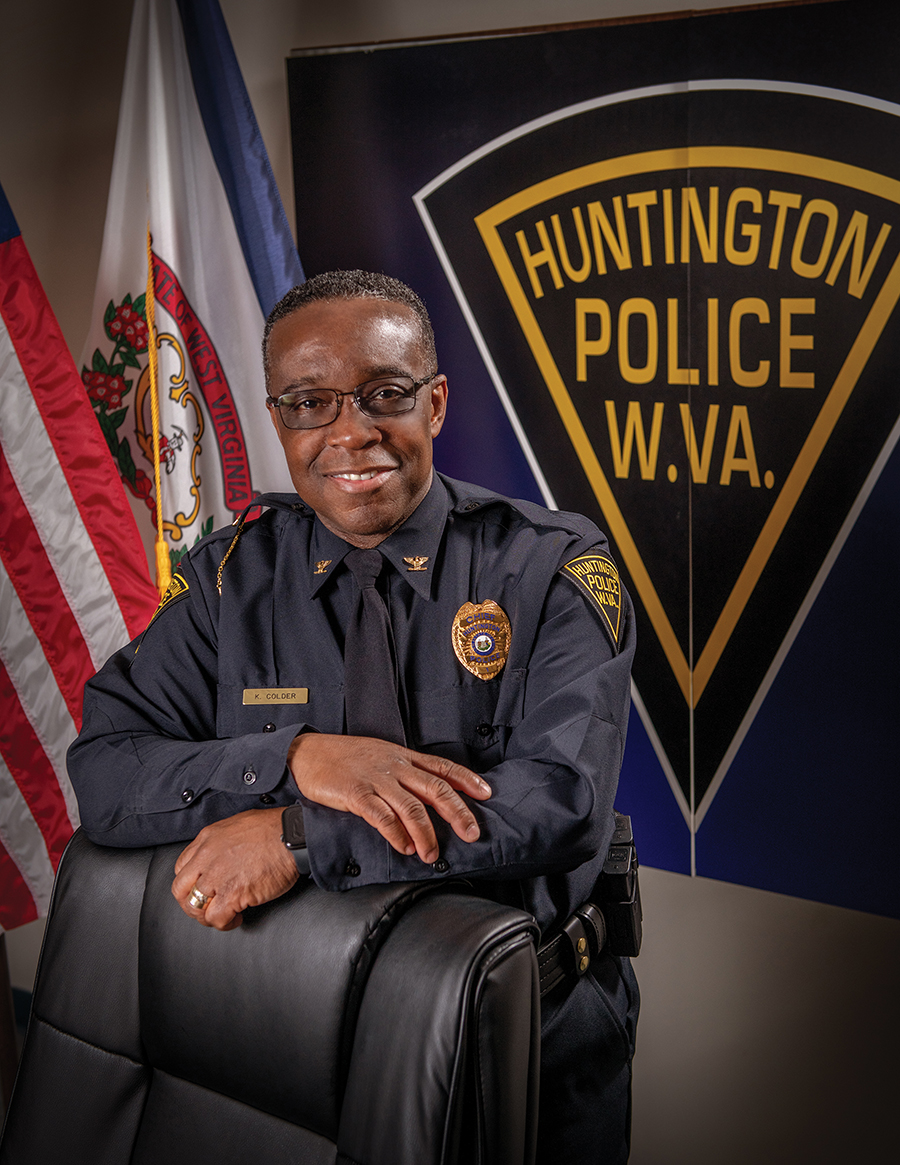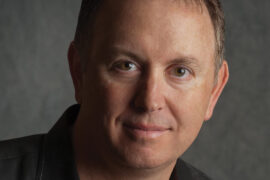A retired DEA special agent makes history as Huntington’s first Black police chief.
By Shelly Ridgeway
HQ 116 | WINTER 2022
When Karl C. Colder was officially sworn in as Huntington’s police chief on Nov. 1, 2021, it was truly a historic moment. On that day he became the city’s first Black chief in the department’s 149 years. The Ashburn, Virginia, native and former special agent in charge for the U.S. Department of Justice Drug Enforcement Administration in the Washington, D.C., Field Division Office is no stranger to West Virginia or Huntington. In fact, he wore out two federal vehicles over five years as the result of dozens of driving trips related to the necessary work to combat the drug epidemic across the state. Making the transition from Ashburn with his wife Sherry for this next chapter in his career is a challenge that Colder readily accepts.
Huntington’s new police chief recently sat down with HQ for a one-on-one conversation about his life and his plans for how to better “protect and serve” the citizens of our community.
HQ: You came to Huntington from northern Virginia, but you’ve lived in other parts of the country, as well. Tell us a little more about your upbringing.
Colder: I grew up in New York City in Manhattan’s Spanish Harlem area. It was a very diverse community. My mother was a lab technician at a New York hospital, and my father spent his career working for the Postal Service. Around age 12, our family moved to Jacksonville, Florida. That was a bit of a culture shock. It was a community that was less diverse and more segregated. At the time, it was pretty much Black and white. As a kid, my father was very involved in youth development, and I got to see firsthand how one person can make a difference in someone’s life.
HQ: With over three decades of experience in law enforcement, this work has clearly been your life’s passion. How did you get your start in the field?
Colder: As a political science student at Cheyney University of Pennsylvania (also the country’s first historically Black college), I had a cousin who was an officer with the Philadelphia Police Department. Also, a good friend at Cheyney was an activist and got me interested in the Student Government Association. As part of my leadership role, I was required to take summer classes and graduated in three years with a second degree in social relations and criminal justice. I eventually applied for a position as a special agent in Philadelphia and entered the police academy in Quantico, Virginia, at age 22. My first assignment after the Academy was based in Philadelphia.
HQ: You chose to focus on drug enforcement, which has been a big problem for many states in recent years. What did your work with the Drug Enforcement Administration (DEA) entail?
Colder: I was what the DEA called a “Special Agent in Charge” in the Washington, D.C., Field Division Office. There, I managed 500 DEA employees across Maryland, West Virginia and Washington, D.C., that included 13 facilities and six federal judicial districts. I was responsible for DEA operations that encompassed regulatory, intelligence, enforcement and administrative functions across 40 agency partners.
HQ: Some people may be surprised to know that you are not a newcomer to Huntington or the challenges faced in fighting drug crime. How did you first become familiar with the city?
Colder: Back in 2013 during my time as a Special Agent in Charge with the DEA, my territory included West Virginia. We were under-resourced, while drug overdose rates in Huntington were among the highest in the country. I knew the challenges that Huntington was facing as the drug epidemic took hold in the area and surrounding communities. We had two offices in state — one in the north and the other in the south. I worked with state, local and national representatives on finding solutions to the problem. We added intelligence analysts and launched the DEA “360 Initiative” that focused on diversion control, community engagement and enforcement development. So, I was a frequent visitor to the state. We still have a lot of work to do, but progress is being made every day.
HQ: The DEA has a rather interesting policy around retirement. You could have left law enforcement altogether after your time there but chose not to. Why?
Colder: There’s a mandatory age limit of 57 or 25 years of service. As it turns out, I hit the maximum number of years at age 50, since I joined the agency at age 22. But I wasn’t ready for retirement. Instead, I launched a consulting business that allowed me to continue working in the field of law enforcement.
HQ: What is it about Huntington that attracted you to the role of police chief?
Colder: By the time I learned about the police chief opening in Huntington, it just seemed like the right fit and time. Mayor Steve Williams has a vision to revitalize the city, and it’s truly an exciting time to be here and be part of the process. Huntington is a great city. I always saw its potential, even under very difficult circumstances related to drug issues and crime. Still, there are many positive things happening here. Sometimes, we need to be reminded of that. Drugs and violent crimes go hand in hand, regardless of the size of the community. By working together, we will make a lasting difference.
HQ: It’s been a very tough couple of years across the country in terms of policing, racial reckoning and protests. As Huntington’s first Black police chief, what does that mean to you?
Colder: I understand the historic significance of this moment, particularly for the Black community, which likely never dreamed it would happen. It is important for the people in the Black community and others to see us in leadership positions. My role as police chief validates that a Black man can lead a police department that is 90% white. I believe we can do a better job letting the public know that our officers are here to support the entire community. Whatever barriers may have existed before, I am committed to putting in the work to erase them. That includes getting to know this community better and looking internally at hiring practices, including recruitment strategies that bring about more diversity throughout our department. I see great talent in Huntington, and having Marshall University in our backyard gives us the ability to source that talent with a pool of highly qualified officer applicants going forward.
HQ: We hear a lot about community policing and its importance. What are your thoughts on it?
Colder: It means getting out from behind the desk to engage with people. It means being out in the community and giving the people an understanding of what we do and how we do it. It’s also rolling up our sleeves to lend a helping hand. These things are important and matter, because we need the community to help us do our jobs even better. If the public doesn’t trust us, they’re not going to be willing to help us. Building trust doesn’t happen overnight. It takes time and that’s where my focus will be.
HQ: What are some of your top priorities as police chief?
Colder: By working together with city officials and the community, I want to stop the flow of drugs into Huntington, strongly enforce the laws we have and educate the public on our efforts so that they know our police department operates from a point of transparency and goodwill.





